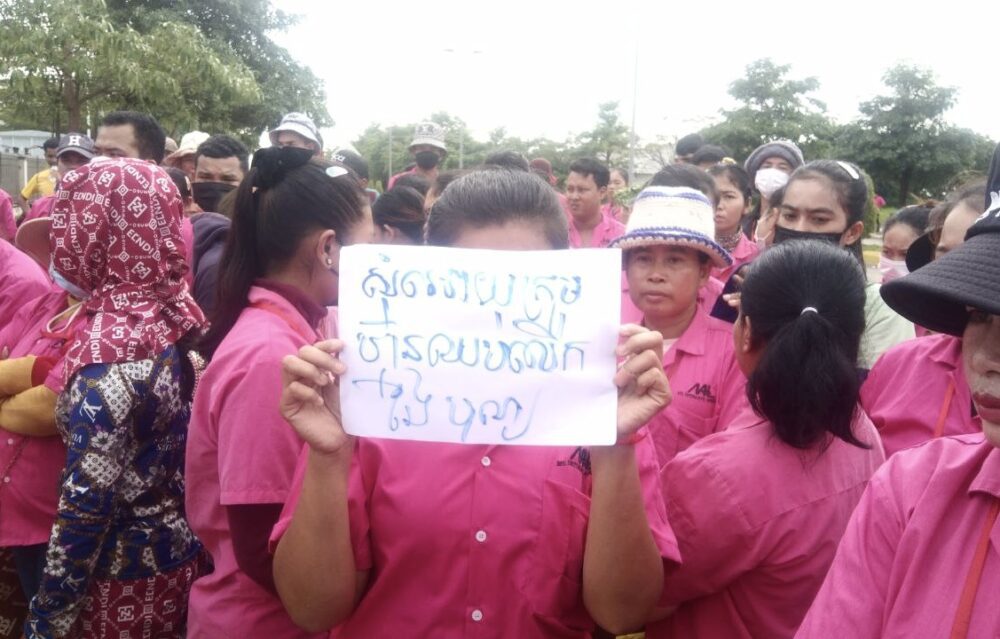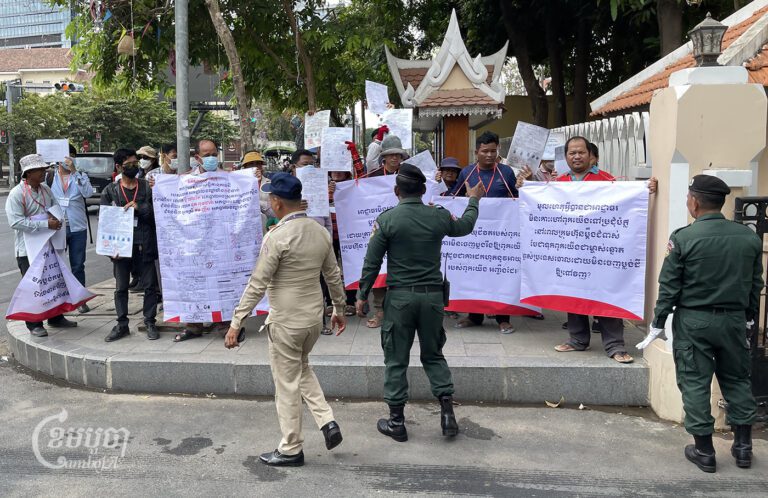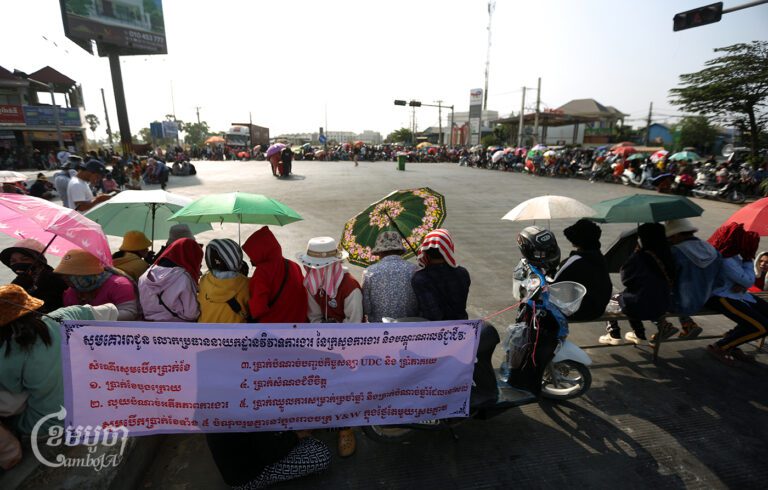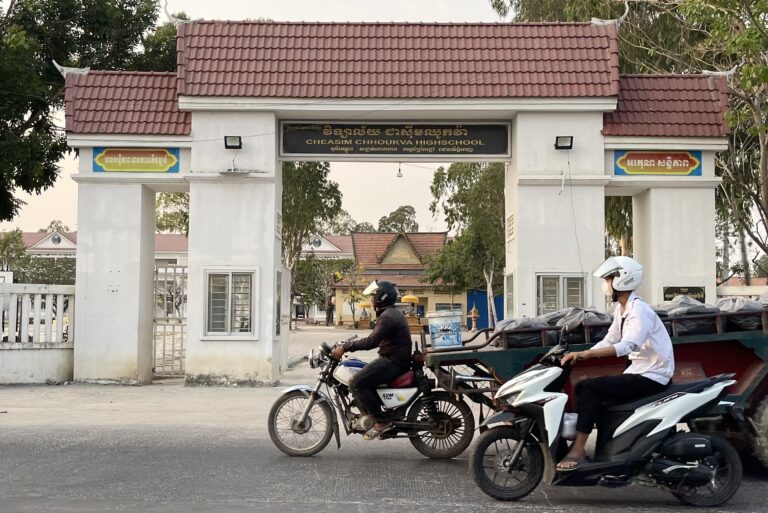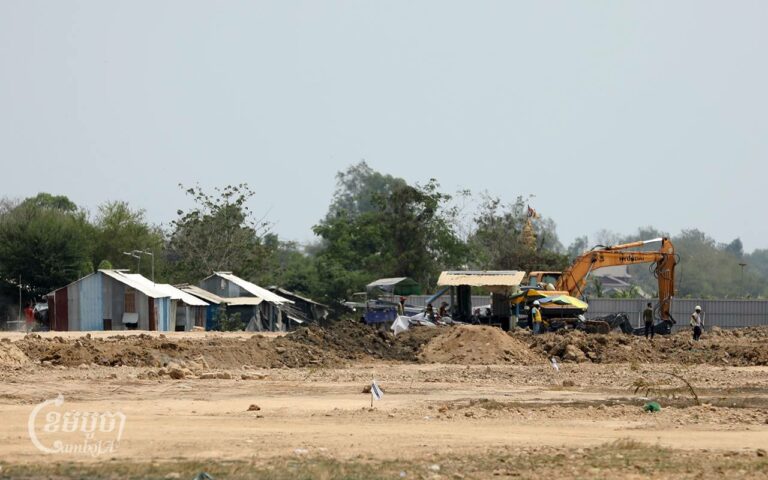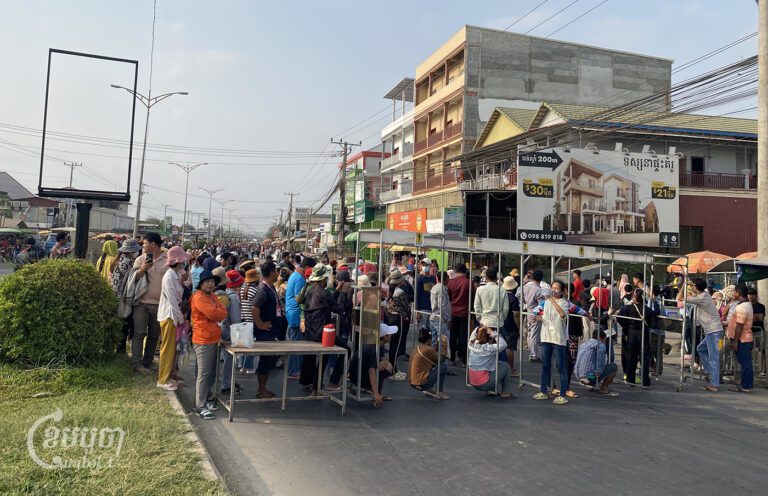Over 10 employees had their contracts terminated for allegedly protesting against irregular wage payments by ML Intimate Apparel (Cambodia) Ltd in O’Neang Special Economic Zone in Banteay Meanchey province on November 08, 2023.
ML Intimate Apparel produces for global brands, such as RougeGorge (France), Hunkemöller (the Netherlands) and Damart (UK), according to NGO Central.
Chea Chanthy, a single mother of a two-year-old, who was among the full-time employees whose contract was terminated on November 13, told CamboJA that she found it difficult to believe the reason given by the company for her termination, which was that there were no orders from buyers.
She said many other full-time and short contract employees are still working there but she and her colleagues, who have worked for the company for about eight years, were terminated after they joined the protest and held placards.
“It is not possible for there to be a problem with no orders because people are still working there,” she said. “I think, because we were holding the [protest] placards, they terminated us. We have been working for eight years and even though the economy is declining, we can [still] do [manufacture] a little.”
Chanthy lamented that due to her lack of knowledge of the law, she did not know how to decline the “instruction to resign” from work.
“When we entered the [employer’s] room, they told us to put our thumbprint and we did what they asked. We could not say anything,” she said.
“They said they will allow us to sue them and that [they] are waiting to receive [our complaint]. But we don’t know the law, and we don’t have any money to sue them.” “ We [know] we will not win, so we took the little compensation they gave us. We are not happy to put our thumbprint. We feel like crying because we want to work so that we’d at least have a small salary for daily expenses.”
Chanthy said she is applying for a job at another place but has not received any answer. In the meantime, the $1,140 compensation she received from the company has almost been spent for her toddler’s milk, water and electricity, and a private loan.
Another worker, Lonh Sary, who also held banners with Chanthy, charged that her termination was a result of her participation in the protest, and not due to an alleged drop in her work performance for “several months in a row” as claimed by the company.
She said for about two months, every worker was doing the same work but there were times, when many of the workers had nothing to do for almost 20 minutes in an hour due to the lack of raw material.
“In fact, there has been a problem of no luggage for more than two months in the factory, so the workload was low for everyone,” Sary said, reiterating that the termination was due to the protest. “It’s because all those who protested were named.”
Although Sary does not want her job back with ML Intimate Apparel, she wants them to justify the $1,140 compensation paid to her.
“I don’t want to go back but I want to ask the company where I worked at for almost seven years why they only paid me $1,140, which includes my salary and annual salary. I want to know if it is in line with the law or not. I just want to know that.”
According to a worker, who declined to be named, irregular salary payments have occurred since the company was established and workers have carried out protests several times.
But each time protests are organized, there is always termination. “Around 400 workers protested this time, and more than 10 workers including full time and short contract employees were terminated after that,” the worker added.
When contacted, ML Intimate Apparel administration chief Ngoun Syvutha denied that the termination was due to the protest, rather it was a result of declining orders. He said the company needed to reduce the number of workers so that it can continue operating.
“As an administration, we see the reality … in November and December, the orders are really declining. For instance, this November, we only have 60,000 orders [..] on the factory side, we have a strategy to keep [operations] going, otherwise the factory won’t be able to sustain and this would affect workers. This is in accordance with the fixed duration contract [FDC] and undetermined duration contract [of the Labour Law].”
Regarding the consistent delay of wage payments, Syvutha said it was due to the global economy and late payments made by their customers to ML Intimate Apparel’s head office in Hong Kong.
He added that the compensation of $1,140 dollars was in accordance with the law, and that around 20 workers had been laid off as of November.
There are currently 551 employees, including administrative staff and garment workers in ML intimate Apparel, which produces women’s undergarments for export to the US and Europe.
Meanwhile, Khun Tharo, labor program manager for Central, told CamboJA that the factory had allegedly violated workers’ rights by forcing them to work overtime, delaying the payroll for a whole month without prior notice, requiring pregnant workers to work for eight hours like other employees, and restricting workers’ freedom of association.
“This factory has a history of persecuting and discriminating against unions. It has very bad working conditions in relation to the usage of FDC to dismiss workers,” Tharo said, adding that going by the labor law, the employer was wrong in delaying the payroll.
He shared that workers who joined protests to demand for regular salaries are “always targeted” for dismissal by employers, even though they possess undetermined duration contracts. Two of the workers who were dismissed had worked there since 2017.
According to Cambodia’s labor law, employment contracts should not extend beyond two years. If they do, they are automatically converted to UDCs.
Tharo pointed to Article 74, paragraph two of the law, which stated that “no dismissal can occur without a valid reason related to the worker’s aptitude or behavior, or the needs of the enterprise, establishment or group.”
After a complaint was filed with the Ministry of Labour and Vocational Training, a union was established in the company but the workers were still “persecuted” and dismissed without proper solutions, Tharo alleged.
“The company does not have a proper way to resolve the problem, and continues to violate the rights of workers,” he said. “The inspection by the labor department has not compelled the employer to abide by the law.”
Noun Sina, director of the Labor Department in Banteay Meanchey, told CamboJA on Monday that he only just received information regarding the termination of an employee by ML Intimate Apparel, and had instructed an inspector from his department to visit the company on Tuesday.
He explained that he was not able to provide any information as yet or determine which party had wronged, suggesting that the press wait while the unit conducts an investigation.
“The department has already assigned an inspector to investigate the case. In relation to this dismissal case, we don’t know yet whether the company or the workers are wrong. Thus, regarding his [the worker] dismissal, we have not determined whether the company fired him illegally.
“We also need to investigate whether the dismissal is related to the economy or not because we know that due to the economy, some enterprises are facing declining orders [which] caused them to reduce the number of workers,” Sina said.
(Additional reporting by Seoung Nimol)


